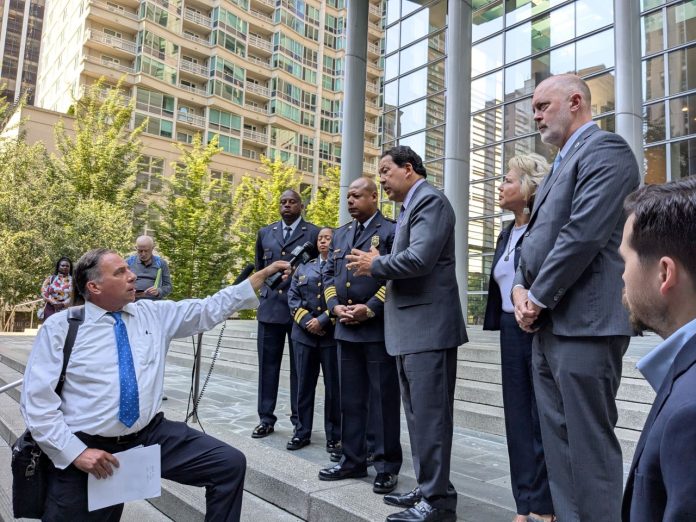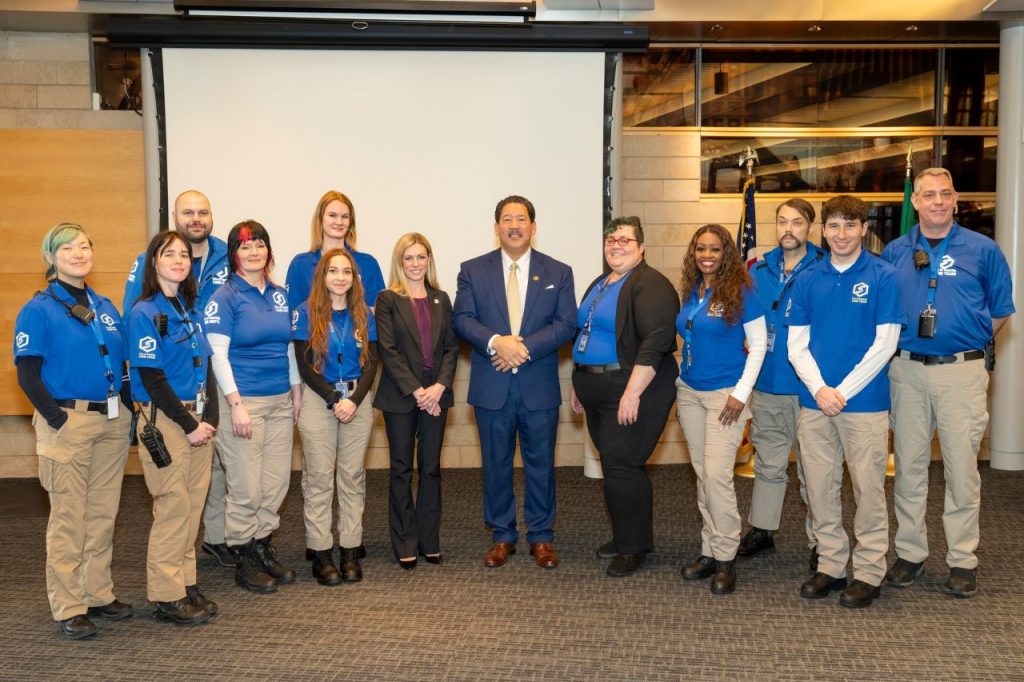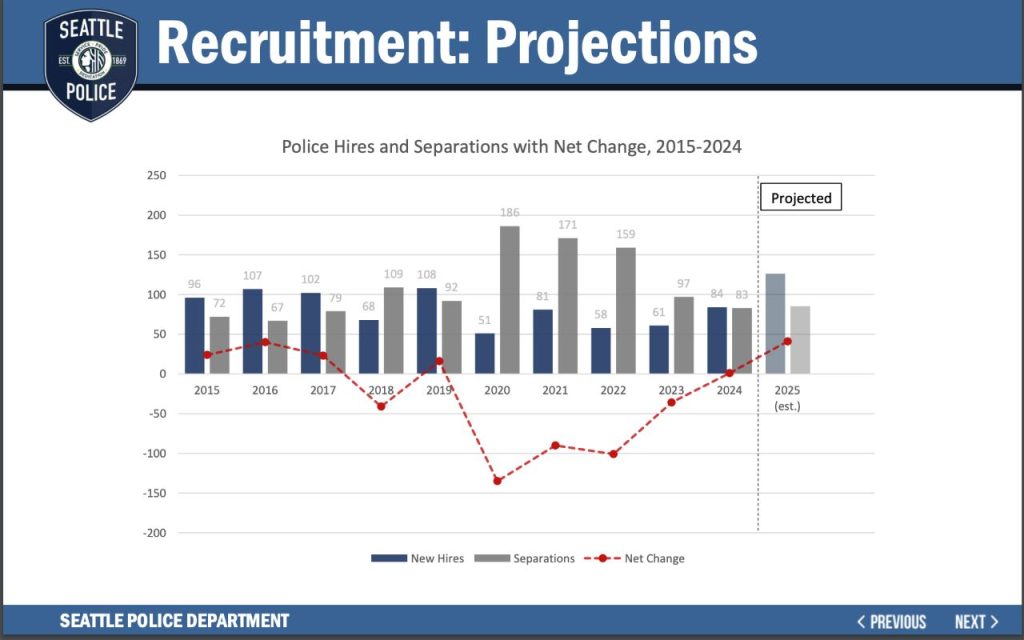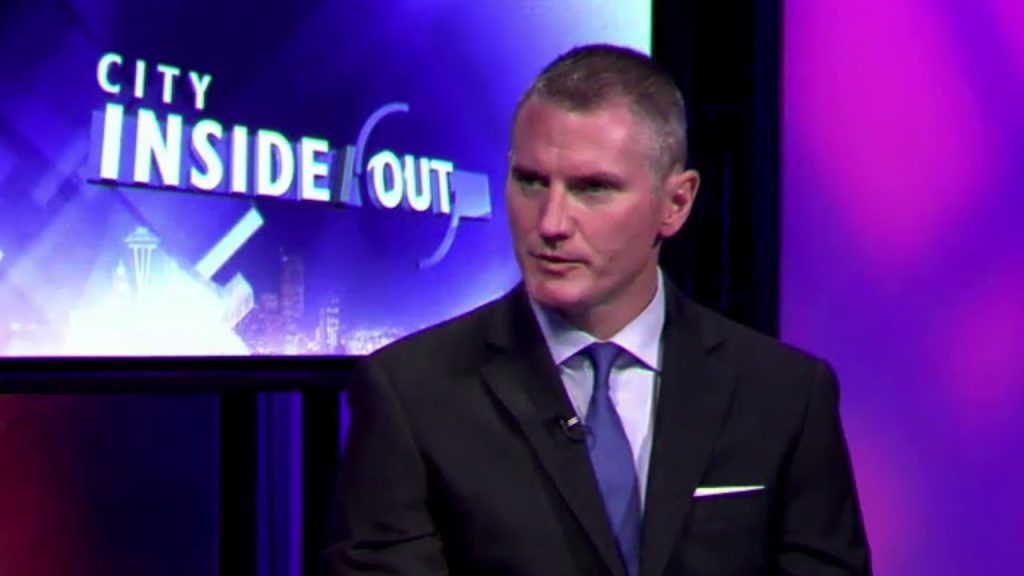
Harrell is pushing to wrap up a new police contract, but will he be around to sign it? And would Wilson drive a harder deal?
In a recent slew of press conferences and public appearances, Seattle Mayor Bruce Harrell has said he expects the City to complete its labor negotiations with the Seattle Police Officers Guild (SPOG) by the end of the year.
Harrell first mentioned this possibility at a press event on September 3, following the hearing during which U.S. District Judge James Robart granted the motion to terminate Seattle’s consent decree.
“I’m very confident here, in a matter of weeks or within this year, we’re going to have another finalized negotiations,” Harrell said. “[SPOG] understand[s] the accountability issues. They understand the growth of the CARE [Community Assisted Response & Engagement] department, which again, is a bargain for condition of employment. So, we’re very optimistic.”
The timing of the expected end to negotiations with SPOG is interesting. Harrell is currently running for reelection, having landed 10 points behind opponent Katie Wilson in the August primary. While Harrell isn’t technically a lame duck since it’s possible he’ll prevail come November, the outcome of the mayoral race is mired in uncertainty. And a new SPOG contract is expected to have a huge impact on the future of the Seattle Police Department (SPD), alternative civilianized crisis response, and the perennial budget deficit.
How we got here
The City’s negotiations with SPOG typically take longer than those with other labor partners.
The City ratified a new SPOG contract in November 2018 and then did not do so again until May 2024, five and a half years later. In addition, the SPOG contract ratified in 2024 only ran through the end of 2023 so was already out of date by the time of its passage.
In 2018, about four years after signing off on the previous one, the city council approved a new SPOG contract resulting in a 17% pay increase for SPOG members. This contract failed to incorporate key pieces of the accountability ordinance passed by the council the preceding year. The issues around accountability were egregious enough that Judge Robart ruled that this contract threw the City out of compliance with the consent decree.
Lorena González and Teresa Mosqueda, then Seattle councilmembers, voted in favor of the contract but later said they regretted it. The sole vote against the contract was cast by Kshama Sawant.
At the end of 2023, the City and SPOG signed a Memorandum of Understanding (MOU) providing SPD officers with a special event premium and higher overtime pay in return for allowing park rangers to operate in more of the City’s parks and signing off on a two-year alternative response pilot program to be run by the Community Assisted Response & Engagement (CARE) department.
The MOU allowed the CARE department to test a dual dispatch system that meant CARE responders had to be dispatched at the same time as police officers and wait for officers to clear the scene. The MOU also limited the size of the alternative response unit to a maximum of 24 responders and limited response to two 911 call types: person down and welfare check calls. In cities where civilian crisis response programs have been implemented most successfully, the departments respond to more types of calls and are not required to bring a police officer. In these cases, civilian responders rarely need to call for police backup

In 2024, the city council voted on a new SPOG contract that provided police officers with a 24% pay increase covering the period of 2021-2023. The City paid a $57.1 million one-time lump sum in officer backpay, and the estimated ongoing additional annual cost for the raise was $39.2 million.
They also signed a new MOU with SPOG allowing civilians to carry out additional duties within SPD.
This new contract contained few gains in accountability and continued to prevent the 2017 Accountability Ordinance from being entirely put into practice. In a hearing in front of Judge Robart in 2024, Assistant City Attorney Kerala Cowart said this new contract was necessary due to SPD’s staffing shortage.
All councilmembers voted in favor of the contract in May 2024 except for Councilmember Tammy Morales, who has since resigned.
Strategy going forward
One of the most concerning strategic implications of last year’s SPOG contract was the perception that the City had given huge raises to officers without receiving meaningful accountability gains in return, potentially ceding leverage in future contracts.
Any contract negotiated now would include raises for 2024, 2025, and potentially beyond, carrying an uncertain price tag.
These budgetary woes are exacerbated by SPD’s new, unprecedented pace of hiring. SPD says they’re on track to hire 172 officers this year for a net officer increase of 91. Next year, they expect to hire 168 new officers with a net increase of 86. This projection of 177 new officers in two years means any negotiated raise will take a larger bite from the City’s budget, eating up even more of the General Fund.

On the other hand, U.S. Immigration and Customs Enforcement (ICE) has launched a TV advertising campaign aimed at poaching SPD officers to serve in ICE instead. “You took an oath to protect and serve, to keep your family, your city safe. But in sanctuary cities, you’re ordered to stand down while dangerous illegals walk free,” the ad states.
ICE is offering hiring bonuses and student loan forgiveness for those who sign up. It’s uncertain if this offer will sway police officers who would have otherwise joined or been retained by SPD.
Also at stake is the fate of the CARE first responders. Harrell has announced investments in his proposed budget, paid for by a new 0.1% public safety tax, that will double the number of CARE first responders operating in Seattle up to 48. But without progress away from the dual dispatch model, as well as permission to have more CARE responders answer 911 calls, CARE’s mission could be hampered.
Finally, a new contract would be an opportunity to institute several long-desired accountability measures, including the use of arbitration in matters of discipline, the standard of evidence for misconduct, and civilianization of and subpoena power for the Office of Police Accountability.
Harrell is under some pressure to complete SPOG negotiations before the end of the year, due to the MOU stating that the CARE pilot is only meant to run until the end of 2025. If Harrell were to complete negotiations before the mayoral election, it might give him another accomplishment to tout before the voting public in what is shaping up to be a tight race.
Whether a new contract boosts Harrell’s chances or makes his path to victory more difficult will depend on the details and whether they contribute to the perception that the City negotiated a good deal.
A contract before the election would also mean SPOG is locked in before we know the election results. SPOG might prefer to negotiate with Harrell as opposed to Wilson, who could prove to be tougher when it comes to police accountability. She has also placed greater emphasis on expanding the CARE department.
“The current mayor negotiated a police contract that overrides accountability legislation passed in 2017, hamstringing the Seattle Police Department’s ability to discipline or fire officers for serious misconduct,” Wilson wrote on her website. “With the $57 million in retroactive salary payments and additional $39 million for 2024-2026, we should have gotten more for our money.”
Harrell’s administration has been reluctant to take a SPOG contract to interest arbitration, with Senior Deputy Mayor Tim Burgess telling The Urbanist last year that he thought the City only had a 50% chance of a favorable outcome should they take that route. Wilson might be more willing to take the gamble in order to push for real accountability gains.
It’s possible Harrell could use the perception that he will be more beneficial to SPOG members to his advantage to pressure a faster resolution to current negotiations. If, on the other hand, negotiations drag on past the election and Harrell were to win, he could lose some of his leverage to come to a quicker deal.
The majority of city councilmembers, most of whom ran on public safety platforms, might also welcome a new SPOG contract sooner rather than later.
Regardless of when the contract negotiations are finished, the council is unlikely to vote on the issue until after budget season concludes on November 21. A December vote means that the new District 2 councilmember – either frontrunner Eddie Lin or his opponent Adonis Ducksworth – will have assumed their council seat and will have a say in the matter.
Council President Sara Nelson and Councilmember Alexis Mercedes Rinck will be able to vote in December regardless of the outcomes of their races, as they wouldn’t cede their seats until January.
Competing narratives
Speaking before Judge Robart at the closing of the consent decree, Harrell said, “I believe that the contract negotiations, relative to all of the aspects of accountability, will be fruitful and productive because I believe that they see what we see now, that accountability cannot be sacrificed in the name of efficient or effective policing.”
When Robart questioned him further, Harrell continued, “In our current negotiations, we’ve done a pretty good job of getting as much as we can get, and now I think what it’s going to hinge upon is the people on the other side of the table, the Seattle Police Officers Guild, to recognize where we must go in modern policing, and I’m convinced that they get it.”
Mike Solan, president of SPOG, seems to have a different outlook on the matter. On a recent episode of his podcast, Hold the Line, Solan said that, especially given Judge Robart’s comments, the City is continuing to press for more accountability.

“The police department in the city of Seattle is the most accountable agency in the nation,” Solan said. “So why is it that they keep on pressing for more of this? Is it because of the financial connection here where there’s a lot of money to be made or is it more based on ideology to push an anti-police narrative or is it a combination of both?”
These don’t sound like the words of a union leader who believes more accountability is necessary for SPD to transition into modern policing.
“It’s like [Judge Robart is] talking about the contract, SPOG, and making sure that the then-2017 accountability ordinance gets put into collective bargaining, and I’ve been in that process in terms of opining on it in this podcast,” Solan continued. “We’re currently bargaining that at the table.”
With time running out before the mayoral election and the end of the year, we’ll soon find out if Harrell delivers on his promise of a new SPOG contract… and exactly how much it will cost the City.
Amy Sundberg is the publisher of Notes from the Emerald City, a weekly newsletter on Seattle politics and policy with a particular focus on public safety, police accountability, and the criminal legal system. She also writes science fiction, fantasy, and horror novels. She is particularly fond of Seattle’s parks, where she can often be found walking her little dog.

